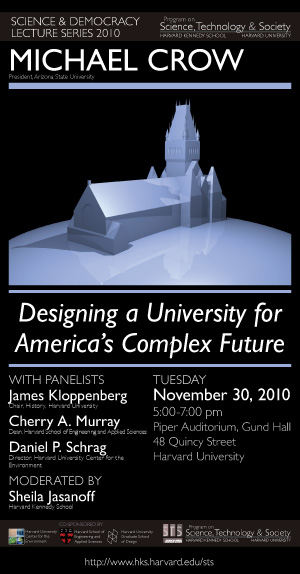Program on Science, Technology and Society at HarvardHarvard Kennedy School of Government | Harvard University |
|||||||
|
|
Designing a University for America's Complex FutureMichael CrowPresident, Arizona State University November 30, 2010, 5:00pm-7:00pm AbstractAmerica is a nation of between 300 and 400 million people that is still growing and that has needs that are vastly more complex than any of the designs our historical higher education system has the capacity to address. There are intricacy issues, global competitiveness issues, performance issues, fiscal issues, as well as more fundamental issues associated with the types of knowledge we are producing and how we are transferring that knowledge to students in higher learning institutions. With that in mind, and with a very narrow differentiation between U.S. universities, the basic design and structure of a new class of higher education institution will be outlined, and a specific case study of the last eight years at Arizona State University will be detailed. ASU is America's newest, largest and most nimble research university in terms of the speed of its evolution and its impact. This design review and exemplar analysis will be carried out in the context of designing universities for America's complex future. PanelJames KloppenbergHistory, Harvard University Cherry A. MurrayDean, Harvard School of Engineering and Applied Sciences Daniel P. SchragDirector, Harvard University Center for the Environment Moderated bySheila JasanoffHarvard Kennedy School About the speakerMichael M. Crow became the 16th president of Arizona State University on July 1, 2002. He is guiding the transformation of ASU into one of the nation's leading public metropolitan research universities, one that is directly engaged in the economic, social, and cultural vitality of its region. Under his direction the university pursues teaching, research, and creative excellence focused on the major challenges and questions of our time, as well as those central to the building of a sustainable environment and economy for Arizona. He has committed the university to global engagement, and to setting a new standard for public service. Prior to joining ASU, he was executive vice provost of Columbia University, where he also was professor of science and technology policy in the School of International and Public Affairs. A fellow of the National Academy of Public Administration, he is the author of books and articles relating to the analysis of research organizations, technology transfer, science and technology policy, and the practice and theory of public policy. Co-sponsored by the Harvard University Center for the Environment, the School of Engineering and Applied Sciences, and the Graduate School of Design. |
||||||
